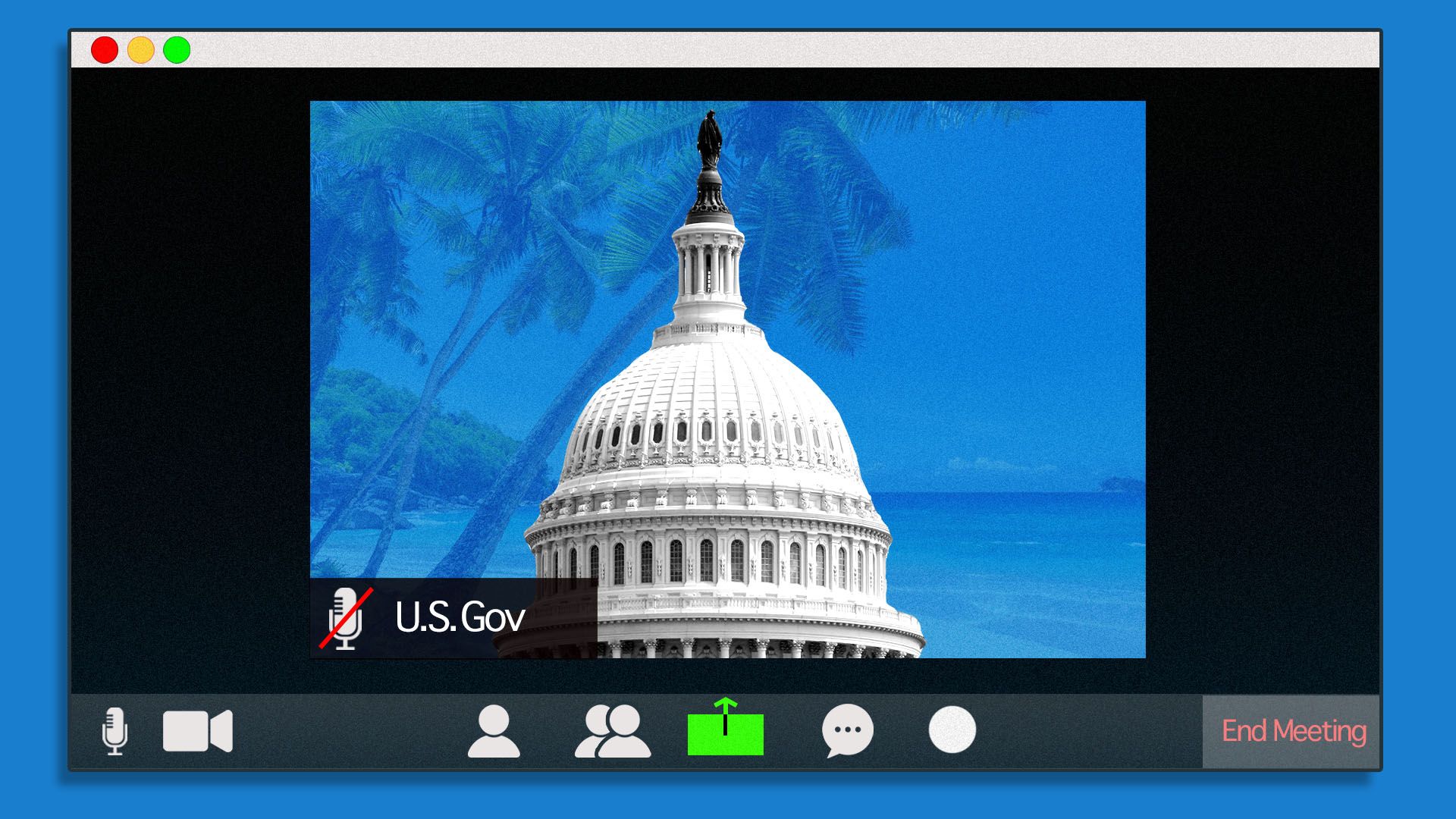Coronavirus forces Congress, courts to weigh remote deliberations
Add Axios as your preferred source to
see more of our stories on Google.

Illustration: Sarah Grillo/Axios
The coronavirus pandemic is creating cracks in the federal government's long-held opposition to conducting business online.
The big picture: Quarantines and social distancing are challenging the way legislators, judges and policymakers are used to operating — though some remain hesitant to upend centuries of tradition and rules.
What's happening: Federal officials are grappling with how to function remotely, with many looking to technological solutions.
- The Supreme Court is postponing most of its docket of upcoming cases but will hear some via phone conference in May. Many lower federal courts already started conducting remote hearings in recent weeks, in some cases using video conferencing, though that shift has stirred some complications.
- Federal agencies are seeking alternatives to what are normally mandatory in-person meetings. The Federal Communications Commission, for one, is holding its monthly meeting by phone Thursday, with plans to stream the audio on the agency's website.
- In Congress, the House is considering options for working remotely.
Where it stands: As the pandemic crisis has propelled a cascade of emergency funding bills, the legislative branch arguably has the most urgent need to find alternatives to in-person meetings.
- The Constitution provides no barriers to Congress operating remotely, but each chamber would have to alter its rules to allow for remote hearings or voting.
- House Speaker Nancy Pelosi recently told MSNBC there are “challenges” to remotely conducting legislative business such as votes. “It’s not as easy as you would think,” she said, citing national security concerns around, for instance, using Zoom to meet.
- And, following GOP objections, Pelosi has eased off an immediate plan to permit voting by proxy — a low-tech solution in which a small number of lawmakers could gather in Washington to vote on behalf of others. Instead, the House is forming a bipartisan task force to review lawmakers' options.
- Republican Rep. Tom Cole, ranking member of the House Rules Committee, told Axios, "If you buy the argument— and I do — that members don't spend enough time working together as it is, all these sorts of things will make it harder to build personal relationships and the types of associations that lead to both bipartisanship and good legislation."
The other side: Supporters of remote operations say Congress shouldn't let tradition get in the way of doing more work virtually.
- "What Congress does is meet and confer and discuss and take action," said Deborah Pearlstein, a constitutional law professor and co-director of the Floersheimer Center for Constitutional Democracy at Cardozo Law School. "And those things are exactly the kinds of functions that can be carried out remotely. Congress has a particular responsibility to set an example to lead, to demonstrate what is responsible and effective public behavior in this circumstance."
- Similar arguments have been made for a more formal, broad push to virtualize federal court cases, especially at the Supreme Court level.
- "It took a pandemic to get the Supreme Court to allow arguments over the telephone — that's a rather significant event for such a small step," said Jonathan Turley, Shapiro professor of public interest law at George Washington University Law School. "In terms of the order of magnitude, it's chilling to think that you need a pandemic to get the court to allow telephonic arguments. That would suggest we would need an apocalypse to allow video taping."
Be smart: 230-year-old institutions don't change quickly, especially ones that rely upon precedent for much of their work.
- Changes could create openings for lawsuits. Connectivity issues could thwart communications at critical moments. And lawmakers would need a well-tested system for conducting mark-ups and hearings.
The bottom line: "I think that there's reluctance to go down the path of something that's so dramatically different than has existed since 1787," said Erwin Chemerinsky, dean of the U.C. Berkeley School of Law. "But this is a pandemic, and we have technology today that didn't exist, say, during the Spanish Flu."
